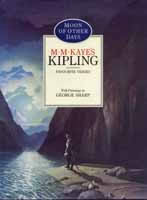Reviews of 'Moon OF OTHER DAYS'
 KIPLING'S EMPIRE STRIKES BACK -
KIPLING'S EMPIRE STRIKES BACK -
MOON OF OTHER DAYS, M M KAYE'S KIPLING FAVOURITE VERSES
It is one of the more depressing aspects of modern life that the average British schoolchild is unable to associate the name Kipling with anything other than the making of 'exceedingly good cakes'. Rudyard Kipling made, not cakes, but exceedingly good poetry and prose.
This was generally recognized in Kipling's lifetime when his collections of stories and verse were best-sellers throughout the British Empire.
However, because a crowd of toff-nosed poseurs known as The Bloomsbury Set regarded him as - let us not mince words - common, and, worse still, 'an imperialist', Kipling's works have fallen with remarkable speed, from grace.
It is true that Kipling was not from the top drawer. Had he not paid his dues in the lower reaches of the social cupboard he would never have been able to write works of plain genius like The Road to Mandalay or Danny Deever.
It is, on the other hand, not true that Kipling was blindly enthusiastic about the British Empire. On the contrary, more than any other writer, Kipling painted British imperialism and particularly the Raj, warts and all.
Unlike his snootier critics, he had immersed himself in it for more than six years - had come to know the brutishness of the ordinary soldier's lot; had come to know it was worse still for the average Indian; and had come to resent with the other 'old India hands', the sneers of those 'travelled idiots' who came over from Westminster for the winter and 'duly misgoverned the land'.
Returning to some of Kipling's finest verses in this sumptuously illustrated volume, edited and annotated by M M Kaye, the author of The Far Pavilions, I am tempted to speculate whether perhaps there was another reason for the critical conspiracy against Kipling.
Was it perhaps that the 'moderns', driven to disguise their lack of talent in formless 'blank verse', resented Kipling's wonderful metric facility? Who among Eliot, Pound and their tiresome successors could equal the easy, evocative music of lines like these?
Dim dawn beneath the tamarisks - the sky is saffron yellow
as the women in the vollage grind the corn
and the parrots seek the riverside, each calling to his fellow
That the day, the starting Eastern Day, is born
Kipling's simple meters, many of them drawn from hymns and music hall songs, drive his words, whether descriptive, narrative or (as they often were) angrily polemic, right to the heart. Read them aloud yourself. It is magical stuff.
He was the true heir of the great English poetic tradition.
Parents striving to rescue their children from mental retardation should ban the watching of Neighbours and sit them down to read this book. Daily Mail, Thursday November 17, 1988, by Campbell Ferguson
